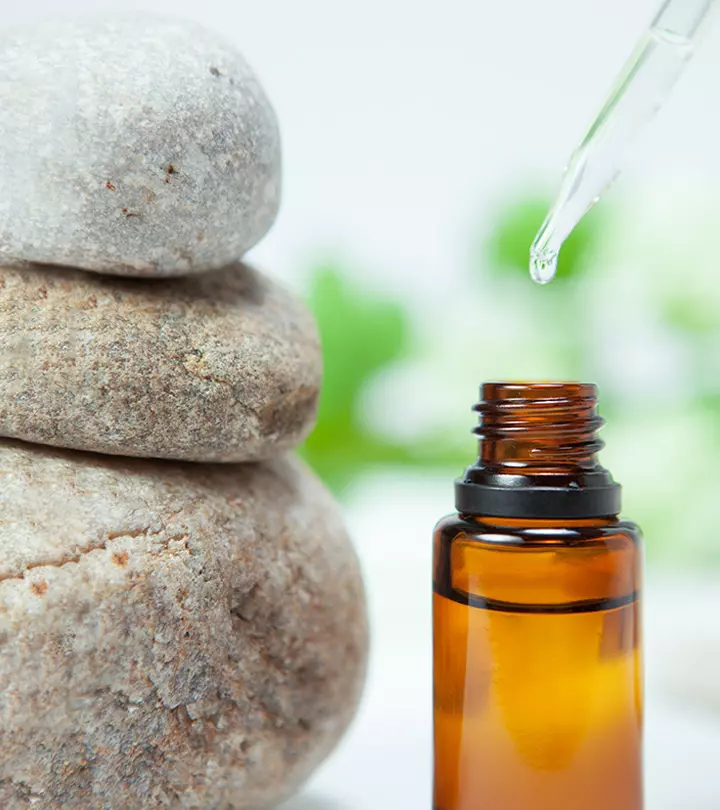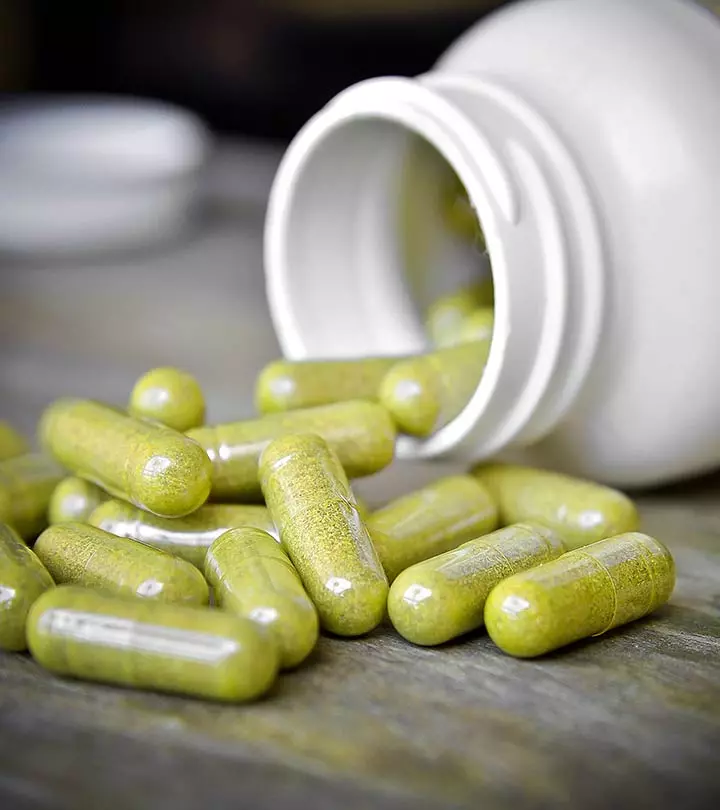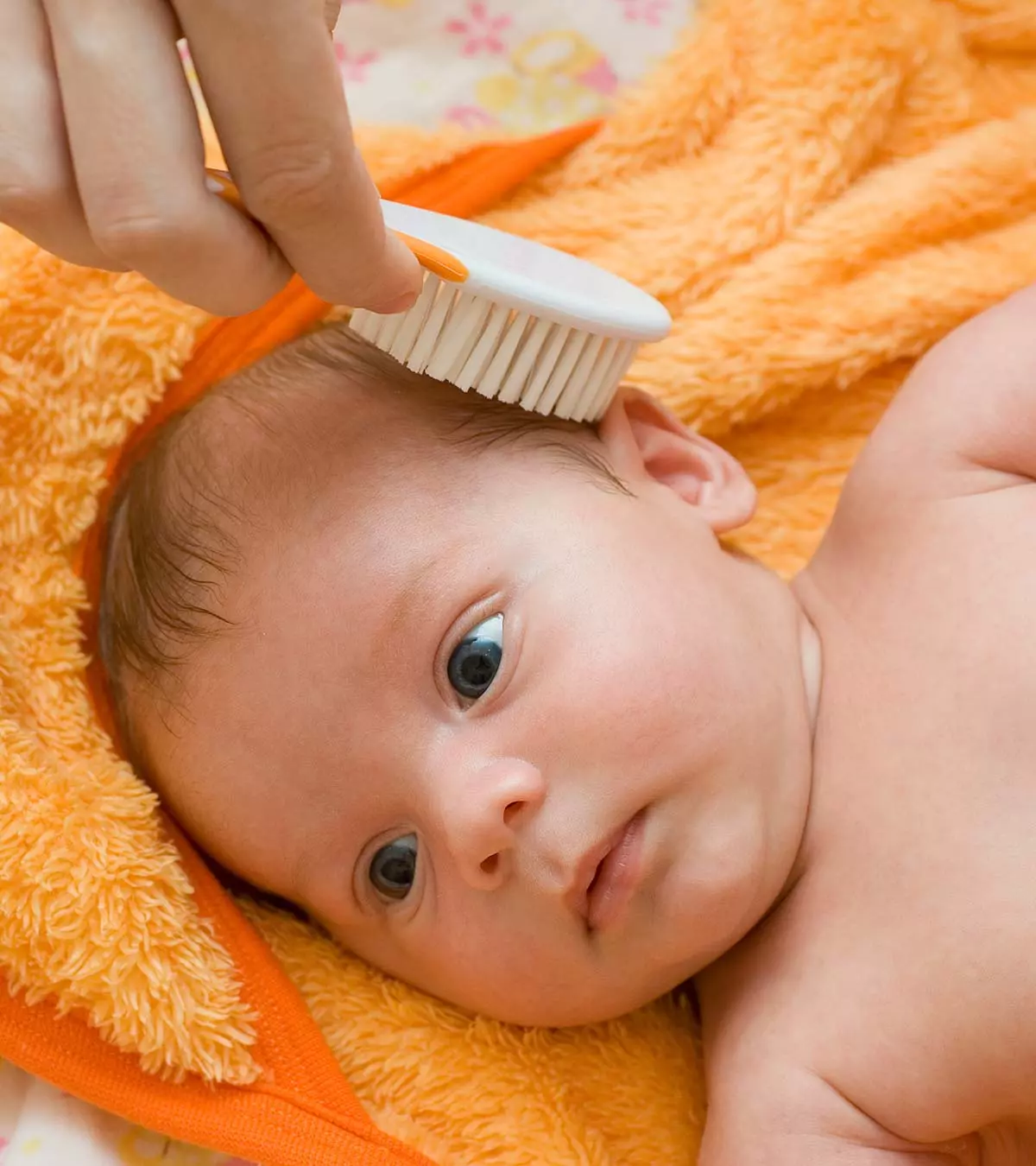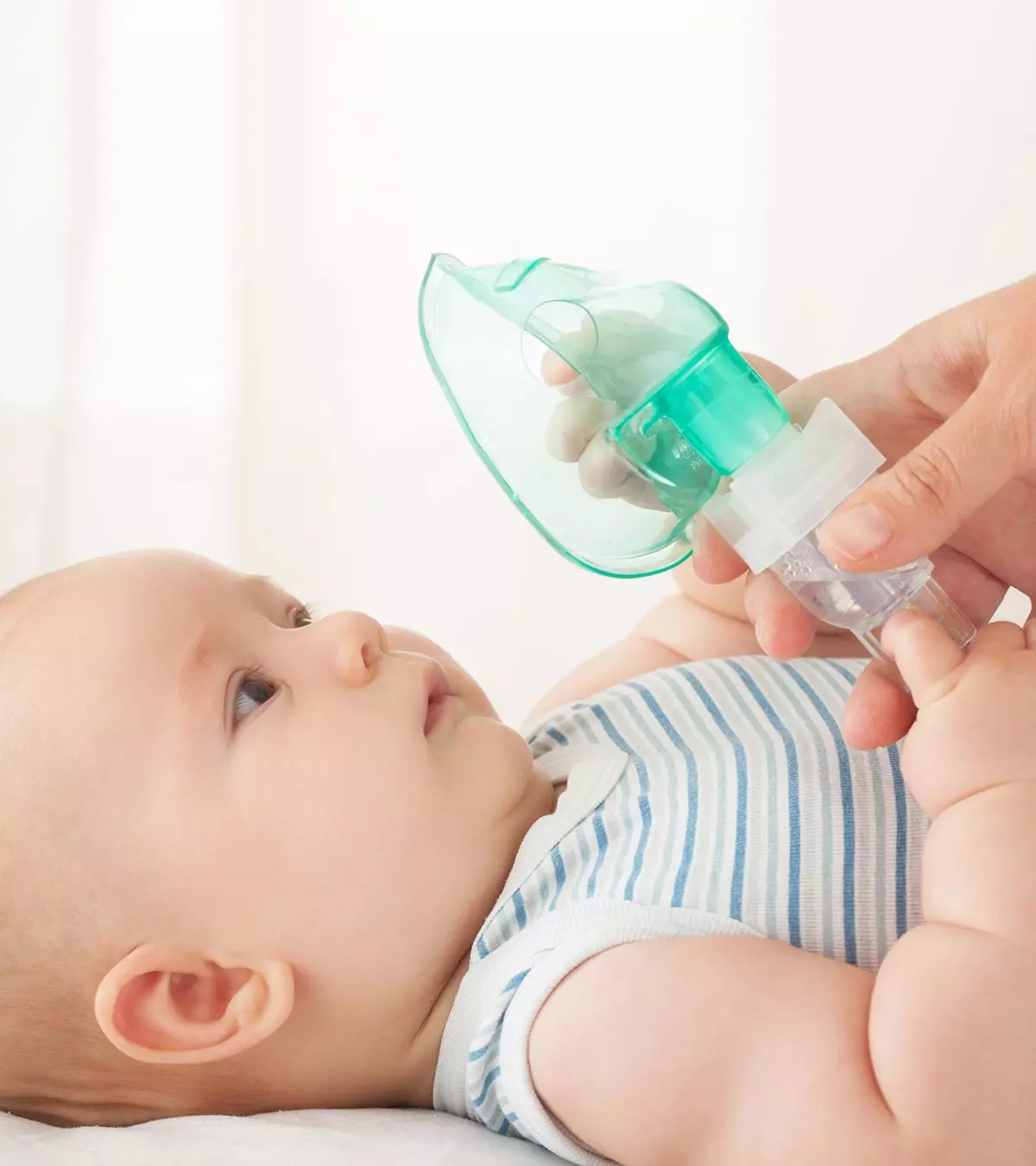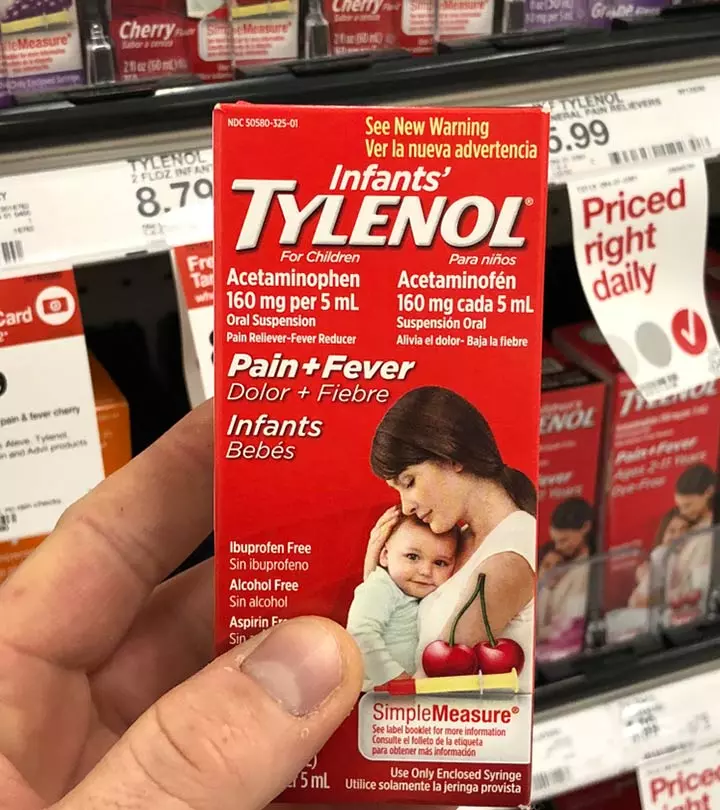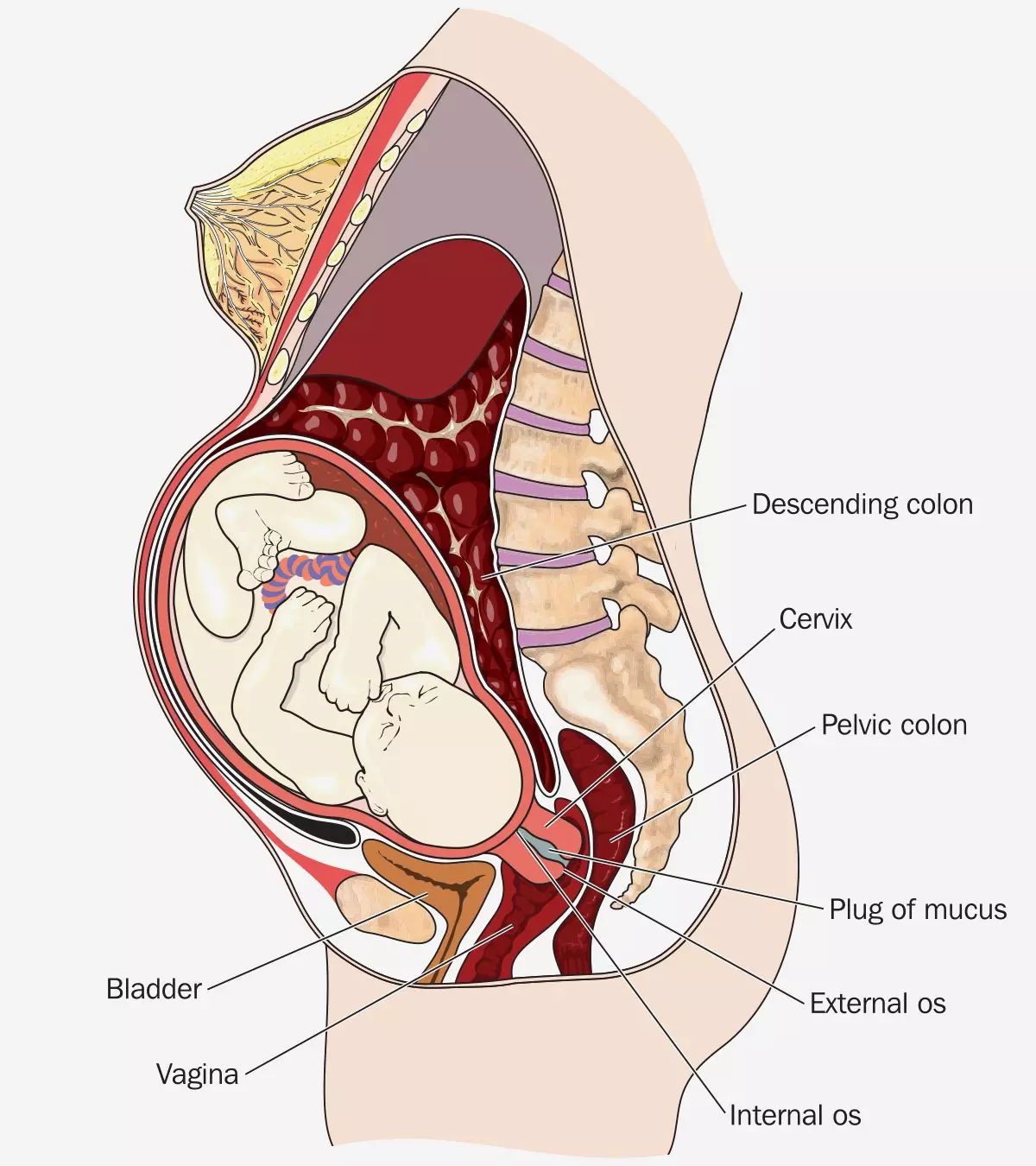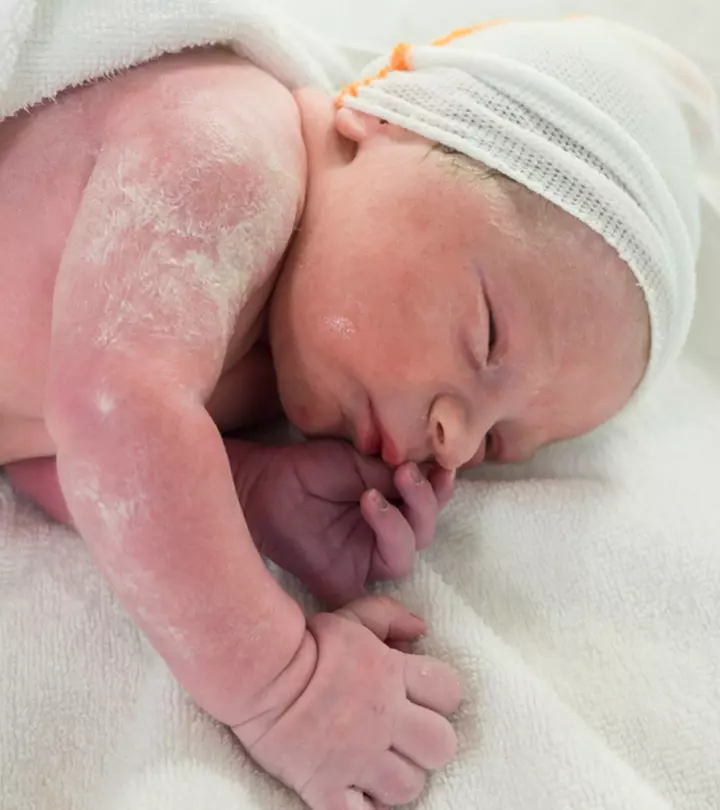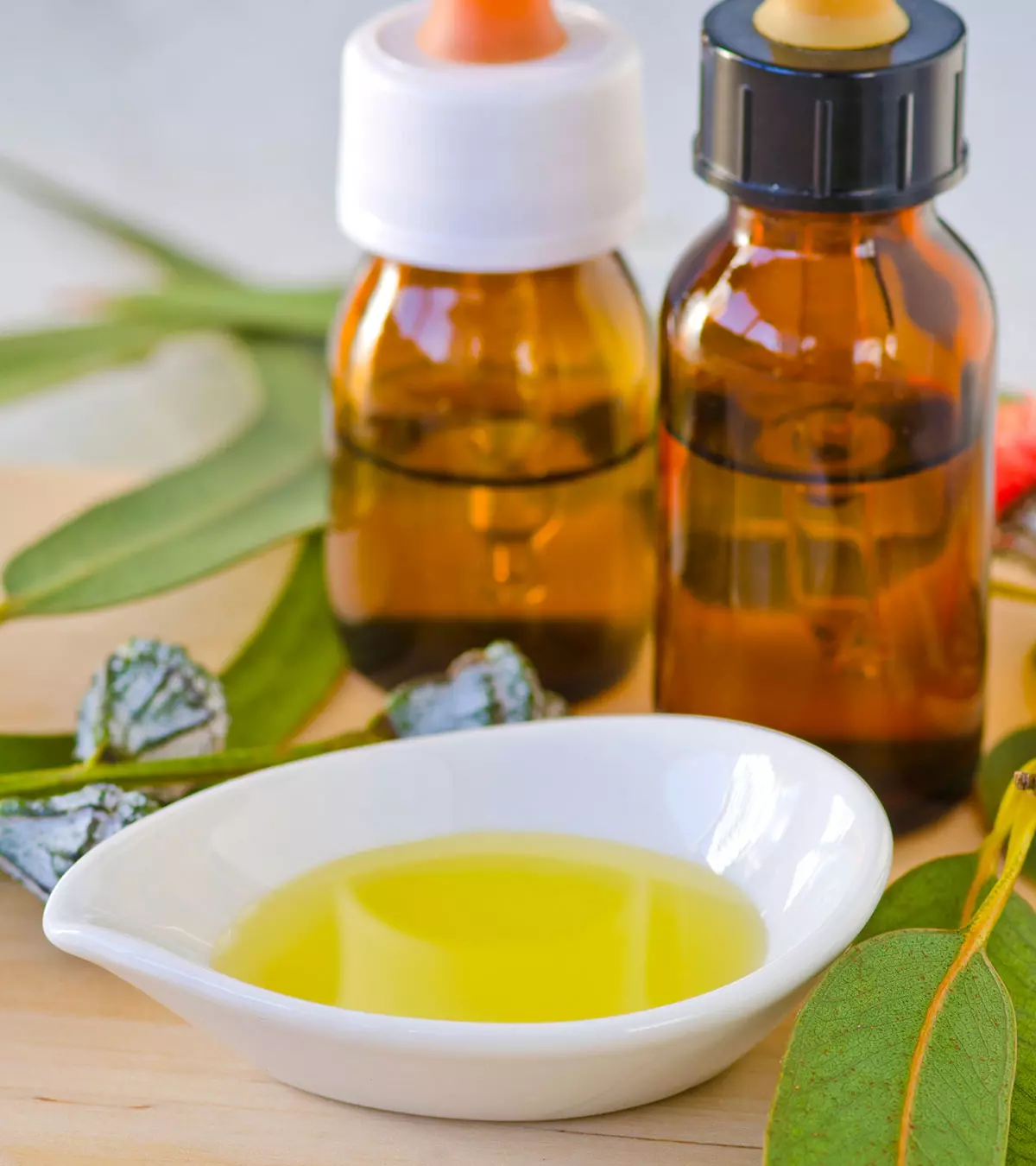
Image: iStock
Eucalyptus oil is a popular essential oil used in natural medicine to treat ailments, such as cold, cough, flu, and bronchitis
(1). It is also found in several over-the-counter (OTC) products like mosquito repellents. In short, eucalyptus oil has always been praised for its potential health benefits in pharmacology as well as home remedies. But is eucalyptus oil safe for babies to treat or manage any of the concerns mentioned above? Its usage depends on the child’s age, intent, and method of use. One must consult a naturopathyiAn alternative medicine approach that uses natural products and ancient practices to treat illness. expert or herbalist to mitigate the risk of side effects due to overuse. However, it is recommended not to use it on children below six years (2). So, read on to explore more about eucalyptus oil, its safety for babies, and why you can’t use this oil for babies. Understanding the potential risks associated with eucalyptus oil for babies can help parents make informed decisions when choosing a home remedy
Key Pointers
- Eucalyptus oil has disinfectant and expectorant properties, making it popular for respiratory disorders.
- The oil is highly toxic for babies and can harm their central nervous system and skin.
- Ingesting eucalyptus oil can cause breathing difficulties, seizures, or coma.
- Keep the oil away from babies under two years old and do not use it for children under ten.
Eucalyptus Oil And Its Components
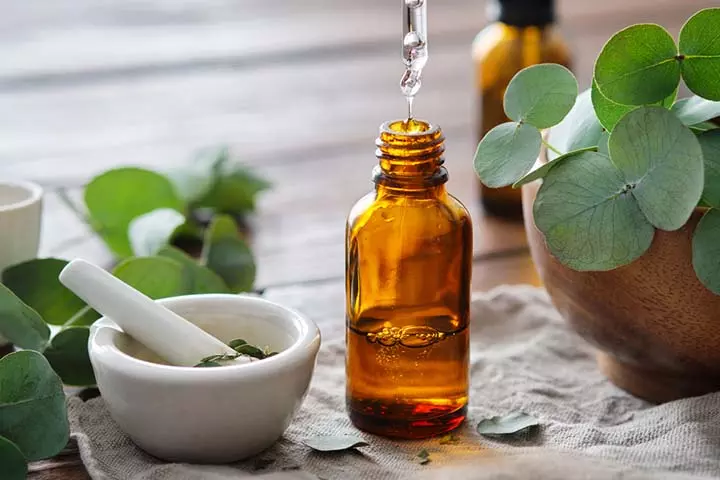
Image: Shutterstock
Eucalyptus oil is an extract from the leaves of the eucalyptus tree. The oil has a composition of more than 100 different compounds. Single-distilled eucalyptus oil, which is crude oil, may contain more compounds in different quantities than double-distilled eucalyptus oil, which is rectified. For instance, eucalyptus globulus oil has nearly 60% cineole and 40% other compounds. Following rectification, the oil contains 80% cineole and 20% other compounds (3).
General specifications and limitations of the oil are mentioned below:
Specifications BP: Eucalyptus Oil
| Constituents | Range – Limit |
|---|---|
| a(alpha) – pinene | Trace to 9% |
| b(beta) – pinene | Less than 1.5% |
| a(alpha)- phellandrene | Less than 1.5% |
| d(delta) – limonene | Trace to 12% |
| 1,8-cineole | At least 70% |
| Camphor | Less than 0.1% |
| Sabinene | Less than 0.3% |
This medicinal oil is a common home remedy to deal with respiratory and bronchial system disorders. The healing vapors from the leaves of the Australian botanical native have been used for years to provide relief from respiratory problems. The oil mainly works as a coolant. The topical application of eucalyptus oil may improve blood flow and even disinfect the area (4). Its expectorant quality makes it a wonderful natural remedy for cough and chest congestion. It has antimicrobial, antibacterial, and anti-inflammatory properties as well. Additionally, the refreshing and cooling aroma of eucalyptus oil may have a calming effect on the mind and body, promoting relaxation and better sleep. It is usually used in holistic wellness centers for providing massages and aromatherapy.
Why Can’t You Use Eucalyptus Oil On Babies?
The many health benefits make us wonder why eucalyptus oil is not safe for babies
. Read the below reasons to clear your doubts (5):
- Essential oils like eucalyptus oil are rich in 1,8-cineole, which can lead to problems related to the central nervous system and breathing in young children.
- The amount of 1.8-cineole in eucalyptus oil depends on the chemotypei of the eucalyptus species.
- Even though a few eucalyptus species may not have much 1,8-cineole, they have other compounds that could be a concern for children.
- This oil is quite strong and has the potential to harm the delicate skin of babies and infants by causing burning sensations and irritation.
- Ingestion may lead to diarrhea, abdominal pain, vomiting, and severe side effects of eucalyptus oil on babies including wheezing and breathing difficulties.

Image: Shutterstock
- Eucalyptus oil applied topically or ingested, may lead to serious problems such as seizures and, in extreme cases, comaiA state in which a person is unconscious and incapable of being awakened. (6).
- For children, who are ten years or younger, the oil should not be applied near or on the face, especially around the mouth and nose.
- The eucalyptus essential oil should be kept away from babies less than two years of age.
, a Virginia-based triple board-certified physician in emergency medicine, medical toxicology, and undersea and hyperbaric medicine, says, “Eucalyptus oil should be used with caution around infants, as it is highly toxic. Severe reactions, including seizures, can occur after inhalation of eucalyptus oil. In some cases, people have developed headaches and bleeding in the brain after using eucalyptus oil vapors to relieve sinus congestion.iA condition produced by anything that irritates or inflames the nasal tissues. ”
 Point to consider
Point to considerAlternatives To Eucalyptus Oil For Treating Baby’s Congestion
Find below a few simple home remedies that can help alleviate congestion and make your baby more comfortable (8) (9) (10).
- Nasal aspirator: A suction device like a bulb syringe or nasal aspirator can be used to remove mucus from your baby’s nose. Apply saline nose drops before suctioning to help loosen the mucus.
- Hot water compress: Placing a lukewarm compress on your baby’s chest may help loosen mucus and ease congestion. Additionally, holding the baby in a steam-filled bathroom for 15 minutes can help relieve congestion.
- Baby rub: Applying a vapor rub on the chest of children older than two years may help relieve chest and nose congestion. Always follow the instructions on the label and avoid applying it under the nose or near the mouth.
- Humidifier: Placing a cool-mist humidifier in a baby’s room can help clear their stuffy nose by adding moisture to the air.
- Saline nasal drops: Several saline nasal drops are available in the market, specifically formulated to treat and manage a baby’s nose congestion.
- Warm baths: Steam from warm baths can also help relieve nose congestion in babies. However, make sure the water temperature is not hot but warm.
Points to Remember
- In case your baby or infant shows breathing problems, take him to a healthcare provider immediately. Your little one needs the prompt attention of a doctor, not the home remedies.
- Ensure that your little one does not ingest the oil. Be even more careful, if there is a family history of asthma. The oil can trigger an asthma attack in your little one.
- It is always good to seek expert advice before using any oil on babies and infants.

Image: Shutterstock
Though the eucalyptus oil is medicinal and is as effective as prescribed or over-the-counter medications, it is not applicable for babies. The application of the oil either directly on the chest or inhalation through a vaporizer or diffuser, to deal with congestion, is good only for adults and not babies.
Parents may assume that a small amount or diluted amount of this medicinal oil may not be harmful to babies, but they can ingest or inhale enough oil (through a vaporizer or humidifier) for a reaction to occur.
Remember: Just because something is called ‘natural’ it is not automatically safe or beneficial for your children.
Frequently Asked Questions
1. Can I put eucalyptus oil in my baby’s bath?
No. Adding eucalyptus oil to a baby’s bath water may cause accidental ingestion of bath water or increased skin irritation.
2. Does eucalyptus oil help brighten a baby’s skin?
Anecdotally, eucalyptus oil was believed to brighten the skin. However, no medical research backs this belief, and the direct application of eucalyptus oil might irritate the baby’s skin. Therefore, it is recommended not to use eucalyptus oil for baby’s skin.
3. Is eucalyptus oil safe to use on premature babies?
Just as it is unsafe for infants, it is also not suitable for premature babies. Premature babies may have a developing respiratory system and more sensitive skin and might be unable to tolerate essential oils.
Eucalyptus oil has been an age-old remedy for problems related to respiratory health. It is also used for massage and aromatherapy for adults as it has a soothing or calming effect. However, using eucalyptus oil for babies may not be safe because it may lead to breathing and central nervous system problems. In addition, its application on the skin may cause burning, and ingestion may lead to diarrhea, wheezing, and seizuresiA sudden, uncontrolled burst of electrical activity in the brain. . Therefore, although the oil has great medicinal benefits, avoid using it on babies, even in small amounts. If your baby experiences any respiratory problems or cough and cold, it is best to ask your doctor to suggest the best natural remedies.
Infographic: Negative Effects Of Eucalyptus Oil On Babies
It’s natural, so it must be safe for babies, right? Unfortunately, this may not always be the case, and one prime example is eucalyptus oil. Although it is known to be therapeutic, you shouldn’t use it on babies. So, learn how this oil may do more harm than good to your little one. Illustration: Momjunction Design Team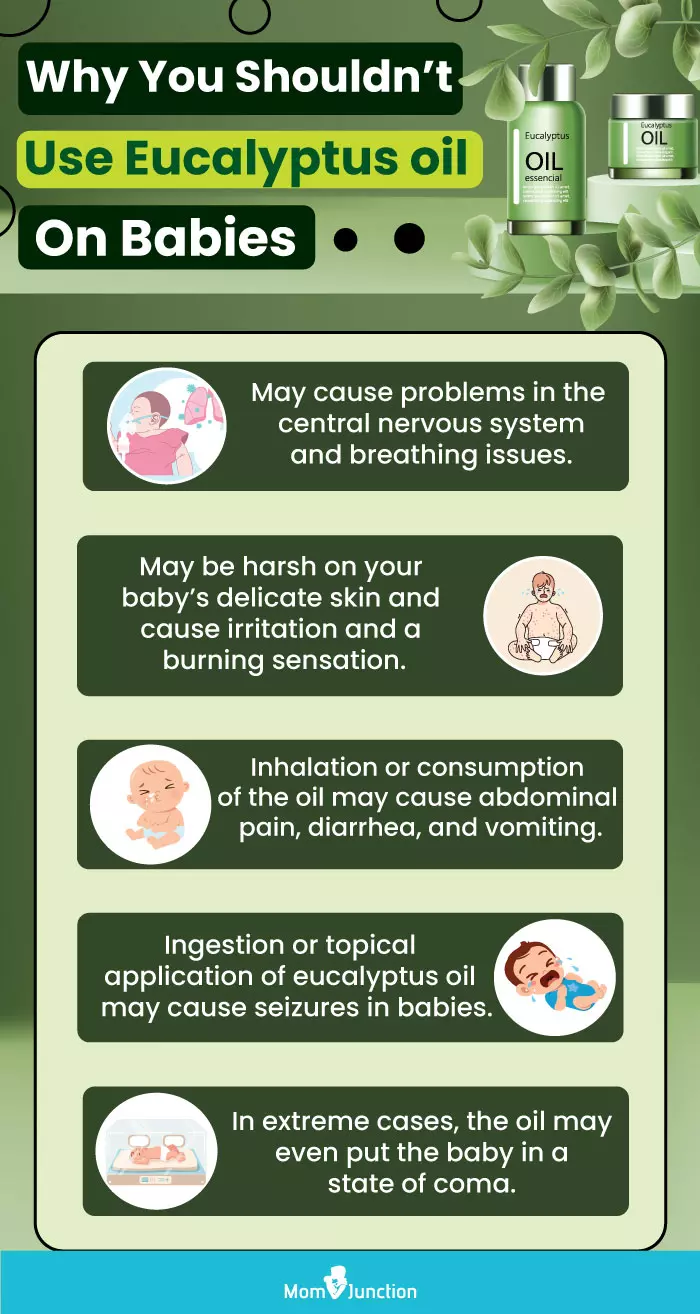
Illustration: Is It Safe To Use Eucalyptus Oil For Babies
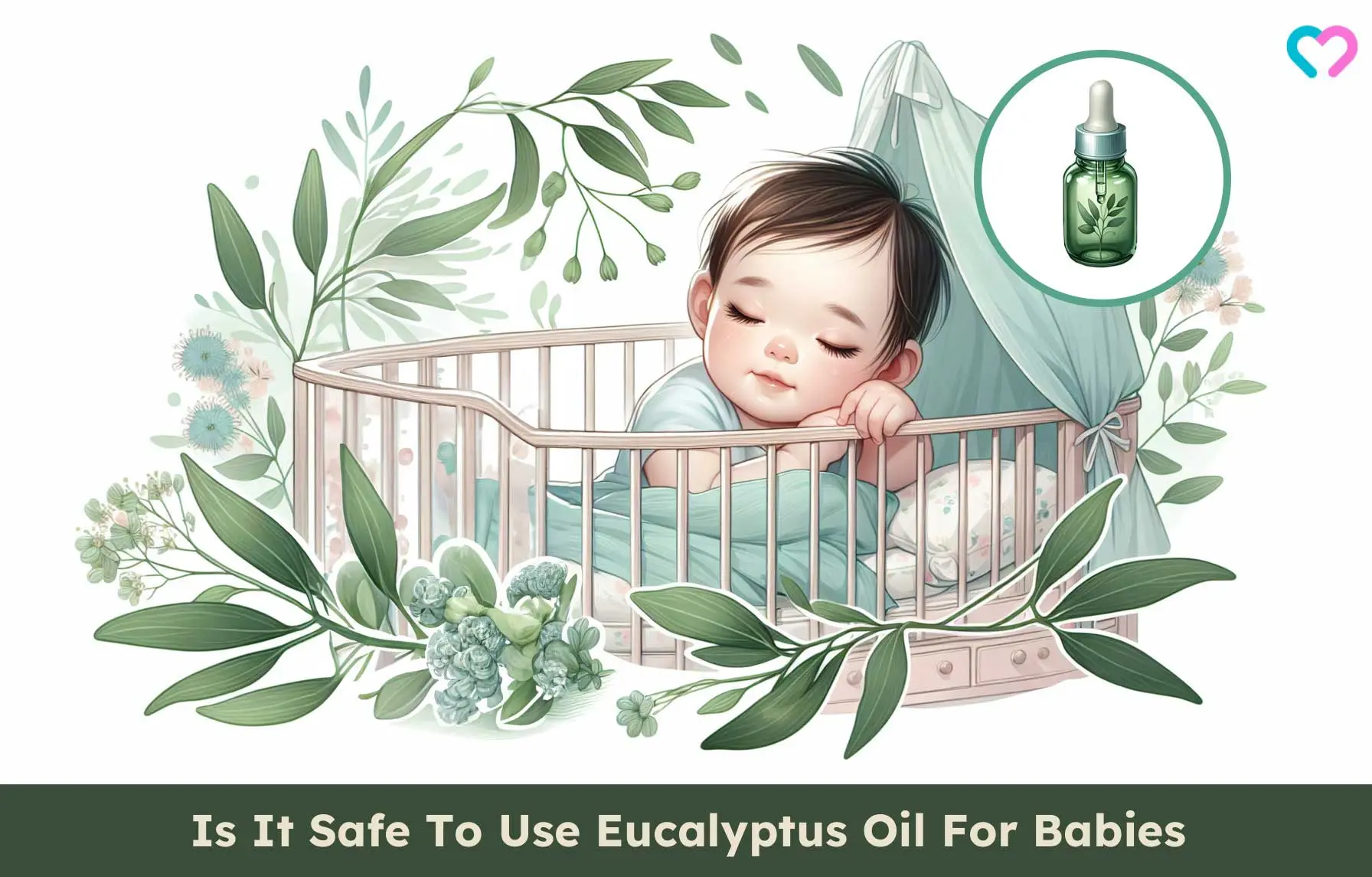
Image: Stable Diffusion/MomJunction Design Team
References
- Györgyi Horváth and Kamilla Ács; (2015); Essential oils in the treatment of respiratory tract diseases highlighting their role in bacterial infections and their anti‐inflammatory action: a review.
https://www.ncbi.nlm.nih.gov/pmc/articles/PMC7163989/ - Eucalyptus
https://www.mountsinai.org/health-library/herb/eucalyptus - Eucalyptus Oil Composition
https://naturalingredient.org/ - Eucalyptus
https://www.peacehealth.org/medical-topics/id/hn-2086009 - Marco Valussi et al.; (2021); Appropriate use of essential oils and their components in the management of upper respiratory tract symptoms in patients with COVID-19
https://www.ncbi.nlm.nih.gov/pmc/articles/PMC7997686/ - Zorina Flaman et al.; (2001); Unintentional exposure of young children to camphor and eucalyptus oils.
https://www.ncbi.nlm.nih.gov/pmc/articles/PMC2804512/ - J Tibballs; (1995); Clinical effects and management of eucalyptus oil ingestion in infants and young children.
https://pubmed.ncbi.nlm.nih.gov/7651249/ - Simple remedies often best for common colds in young children.
https://publications.aap.org/aapnews/article/32/12/32/24012/Simple-remedies-often-best-for-common-colds-in?autologincheck=redirected - Natural Alternatives: Five home remedies that are safe for infants.
https://www.childrensnebraska.org/health-news/natural-alternatives-five-home-remedies-that-are-safe-for-infants/ - Coughs and Colds: Medicines or home remedies?
https://www.healthychildren.org/English/health-issues/conditions/chest-lungs/Pages/Coughs-and-Colds-Medicines-or-Home-Remedies.aspx - Eucalyptus oil overdose.
https://medlineplus.gov/ency/article/002646.htm - Poisoning and child safety.
https://www.betterhealth.vic.gov.au/health/healthyliving/poisoning-and-child-safety
Community Experiences
Join the conversation and become a part of our nurturing community! Share your stories, experiences, and insights to connect with fellow parents.
Read full bio of Dr. Wayne Hough
- Dr. Kelly Johnson-Arbor is triple board-certified in Emergency Medicine, Medical Toxicology, and Undersea and Hyperbaric Medicine. She completed her MD from Loyola University Stritch School of Medicine and works at National Capital Poison Center.
 Dr. Kelly Johnson-Arbor is triple board-certified in Emergency Medicine, Medical Toxicology, and Undersea and Hyperbaric Medicine. She completed her MD from Loyola University Stritch School of Medicine and works at National Capital Poison Center.
Dr. Kelly Johnson-Arbor is triple board-certified in Emergency Medicine, Medical Toxicology, and Undersea and Hyperbaric Medicine. She completed her MD from Loyola University Stritch School of Medicine and works at National Capital Poison Center.
Read full bio of Dr. Ritika Shah
Read full bio of Swati Patwal
Read full bio of Ghazia Shah





 Quick tip
Quick tip




